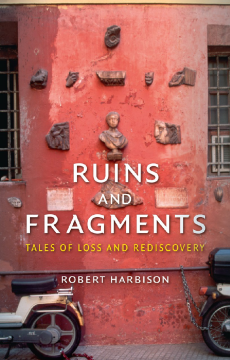
Additional Information
Book Details
Abstract
What is it about ruins that are so alluring, so puzzling, that they can hold some of us in endless wonder over the half-erased story they tell? In this elegant book, Robert Harbison explores the captivating hold these remains and broken pieces—from architecture, art, and literature—have on us. Why are we, he asks, so suspicious of things that are too smooth, too continuous? What makes us feel, when we look upon a fragment, that its very incompletion has a kind of meaning in itself? Is it that our experience on earth is inherently discontinuous, or that we are simply unable to believe in anything whole?
Harbison guides us through ruins and fragments, both ancient and modern, visual and textual, showing us how they are crucial to understanding our current mindset and how we arrived here. First looking at ancient fragments, he examines the ways we have recovered, restored, and exhibited them as artworks. Then he moves on to modernist architecture and the ways that it seeks a fragmentary form, examining modern projects that have been designed into existing ruins, such as the Castelvecchio in Verona, Italy and the reconstruction of the Neues Museum in Berlin. From there he explores literature and the works of T. S. Eliot, Montaigne, Coleridge, Joyce, and Sterne, and how they have used fragments as the foundation for creating new work. Likewise he examines the visual arts, from Schwitters’ collages to Ruskin’s drawings, as well as cinematic works from Sergei Eisenstein to Julien Temple, never shying from more deliberate creators of ruin, from Gordon Matta-Clark to countless graffiti artists.
From ancient to modern times and across every imaginable form of art, Harbison takes a poetic look at how ruins have offered us a way of understanding history and how they have enabled us to create the new.
“There is a beauty in the symmetry between Harbison’s subject matter and his style . . . those of us who love his work love precisely the way those intellectual jumbles reflect an idea about the world . . . Harbison’s books . . . consistently provide brief, fragmentary glimmers of hope.”
— New Yorker“Teeming study of the aesthetics and reality of ruins. . . . Harbison is well placed to explore these dilapidated cultural precincts. . . . Harbison's wide-ranging meditation on the allure of decline and decay is an erudite addition to the literature.”
“Drawing parallels from modernist literature and art, Harbison suggests that the ruin and the fragment appeal to contemporary sensibilities precisely because of their incompleteness and their embodiment of loss and nostalgia. With the destruction of sites of antiquity by Isis, this is a timely and beautifully written study of why we are so attached to pieces of the past.”
— Financial Times“Ruins and Fragments is a wonderfully alluring poem of absence: it weaves together such diverse strands as the language of Finnigan’s Wake, the montage of Eisenstein and Dziga Vertov, the aggressions of analytical Cubism and the reconstruction of the Warsaw Market Square into an enticing panorama of our perplexing times.”
— Joseph Rykwert, author of The Judicious Eye, The Seduction of Place and The Idea of a Town“A marvelous story-teller and shorer of fragments, Robert Harbison surveys the destiny of ruins from Oxyrynchus to the films of Ozu, to Phimai and beyond. Yet his underlying concern remains the aftermath of ‘war, cruelty, suffering’—the perpetual assault of human folly upon human constructions—and the history of our often poorly conceived attempts to rebuild. Harbison has composed a spell-binding meditation on the inevitability of fragmentation and dispersal.”
— Susan Stewart, Avalon Foundation University Professor of the Humanities and Director, Society of Fellows in the Liberal Arts“An extended meditation on disruption and discontinuity in (largely) Western culture, on fractures, on remembering and forgetting what we have lost, and on the ‘rough edges’ of our cultural world, from architecture to literature.”
“Harbison proves a keen observer of the paradoxes of reconstruction.” — Mary Beard, Times Literary Supplement
Robert Harbison is former professor of architecture at London Metropolitan University. He is the author of many books, including Reflections on Baroque, Travels in the History of Architecture.
